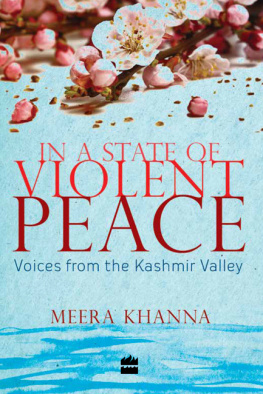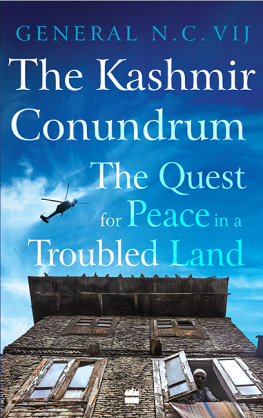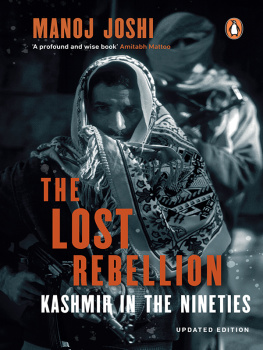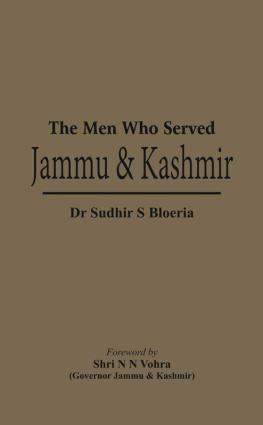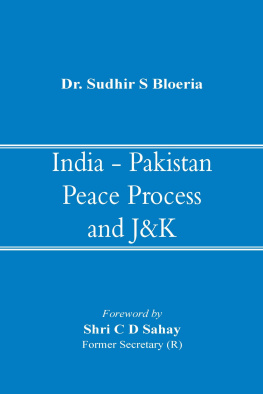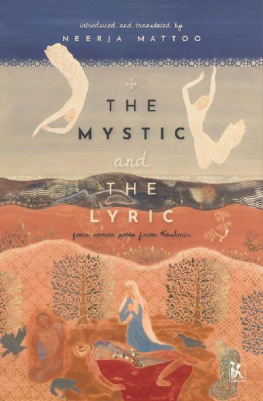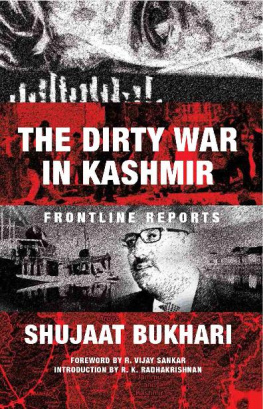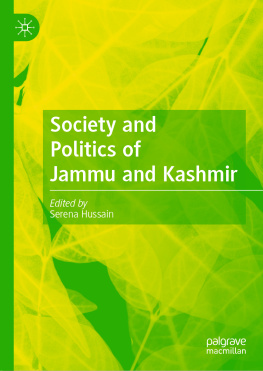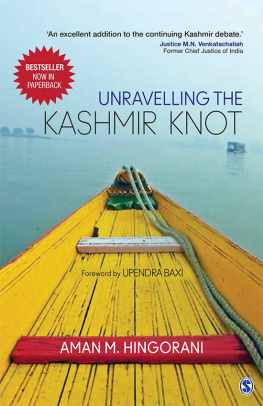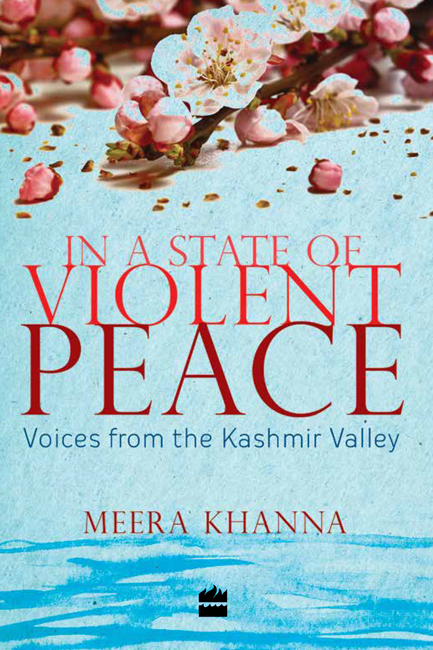
For the generosity of the Kashmiri spirit that entrusted
invaluable memories to me
We must recognize the chief characteristic of the modern eraa permanent state of what I call violent peace.
Admiral James D. Watkins
CONTENTS
T he history of the Kashmir Valley and its conflict is almost always understood in terms of political events, wars fought over the territory, border skirmishes, militant attacks, grouping and regrouping of terrorist outfits and political parties, and the many round-table discussions. But the human stories behind these events are never the focus, or are quickly consigned to collective amnesia. The alternately simmering and raging conflict has had an inexorable hold on the lives of the people. Kashmiri lives have influenced and been influenced by the conflict. In the plethora of literature on Kashmir, this vital human element gets relegated to the background.
This book seeks to explore the insidious ways in which political events change human lives forever. It is an attempt to humanize the Kashmir conflict.
This is not a collection of stories in the strictest term. These stories are neither born of my imagination nor are they fiction. They are based on real-life incidents that have had a catastrophic impact on the lives of the protagonists. At the same time, they present a cameo of the different dimensions of the conflict that has held the Valley in an almost claustrophobic grip. In a sense, these stories are actualized fiction, or fictionalized facts, depending on the view one takes.
The collection covers a spectrum in terms of time, from pre-1947, when Kashmiris rose to throw off the political structure of monarchy, to the first decade of the twenty-first century, when militancy as a tool of revolution was failing.
The fourteen narratives in this collection are a window into the lives of the ordinary Kashmiri caught up in the violence spewed by the myopic policies of two nations which bring their national egos to every negotiating table. These are the stories of people caught up in the tide of events not of their own making.
These are the stories that underlie history.
it strikes her, as she walks, that borders, like hatred, are exaggerated precisely because otherwise they would cease to exist altogether.
Colum McCann, Zoli
B ismillah al Rahman al Rahim. The grim-faced soldiers on the newly etched border between India and Pakistan listened to Naseer Ahmed Shah, a medical student, reciting the verses from the Koran. Once his Muslim credentials were proved, Naseer was allowed to enter Pakistan. Naseer hailed from a family of Syeds who were revered as saints, but for him his identity had always been based on his nationality, profession and worth as a human being. Religion had always been a personal space, and here he was being forced to flaunt his identity as a Muslim publicly so that he could travel ahead.
It was 29 September 1947. As he travelled from Kohalla to Rawalpindi, Naseer was shocked at the catastrophic changes overtaking the subcontinent. In July, when he had gone home to Srinagar from medical college, he had travelled from British India to the kingdom of Kashmir. The scratching of a pen on a map, by unknown faces sitting in New Delhi, had created two nations overnight, but the fate of Kashmir hung in limbo. Naseer was confident that Kashmir would not be in a stagnant political state for too long. Inspired by Left ideology, Naseer had joined the National Conference, convinced that its leader Sheikh Abdullah would usher in rule of law based on equality, something that was unthinkable in the feudal structure of monarchy. Kashmir, having acceded neither to Pakistan nor to India, was holding on to its tenuous independence.
As the bus jolted over the potholed road, Naseer thought of the day when he had applied for admission to the newly established Balak Ram Medical College in Lahore. He was denied admission since it was funded by Hindu religious institutions. For Naseer it was another brush with the dark side of fundamental ideology. He reflected on the irony: once, admission to college had been denied to him because he was Muslim, and now entry to the country of his college had been granted because he was a Muslim. Naseer continued to study in King Edwards Medical College and was now travelling to complete his final year. He was looking forward to going home to Srinagar soon.
Unknown to Naseer, fate was to keep him away from home for a long time.
Rawalpindi station was in a shambles. It was pitch-dark and, as Naseer walked up the platform aided by the flickering torchlight, he tripped over a sleeping man. He apologized profusely, but got no response. To his absolute horror he realized the mans head was practically severed from the neck. Naseer felt sick. He saw that the platform was filled with bodies of refugees from across the border. Partition had come to the subcontinent accompanied by mindless bloodshed and a huge exodus of Hindus and Muslims. The stench made him puke on the tracks. At a little distance away, he could see the body of a woman holding on to her small child. Both had a gaping bloody gash across the stomach. A single violent stroke had severed mother and child from life and from each other. He sat down on the platform surrounded by mutilated corpses, numbed by horror, only to spring up in terror as a hand touched his shoulder.
They were some medical students from Peshawar. Dont be afraid. We are also stuck here in Rawalpindi and we want to go to Lahore.
Naseer surreptitiously wiped his tears, thankful for the dark. I am studying at King Edwards Medical College. But how can we reach Lahore? My classes are beginning within a day.
I dont think classes will resume so fast in these troubled times. But we can meet the stationmaster. He should be able to guide us.
The stationmaster was a harassed man. But to his credit he gave the medical students a hearing. He had an intelligent and practical suggestion. You can take a ride in an engine that is going up to Wazirabad to bring back some bogeys. From Wazirabad you can walk or take a bus to Lahore. But you will have to wait for three to four days since the tracks at Lahore are submerged in water. Naseer fingered the hundred-rupee note in his pocketall the money he had to stay in a strange city with no friends and for an indefinite period. The stationmaster read the sheer desperation on the boys faces. You can live on the platform and I can offer you tea and one meal. In return, you will inoculate the long lines of refugees coming in from India. We dont want a cholera epidemic in the city.

Naseer wiped his forehead with a filthy handkerchief; it only made his face dirtier. It was four days since he had come to Rawalpindi, and he had not bathed or changed his clothes. The lines of weeping women, hungry children and sullen men went on and on. Everyone had a tale to tell, each more traumatic than the last.
Doctor sahib, I am the only survivor of my family of nine.
Doctor sahib, where will I go? My husband and father-in-law were cut down in front of me.
Beta, how can I find the house of Aslam Mohammad? His widowed daughter is with me.
With one needle and syringe, Naseer inoculated hundreds of men and women against the dreaded disease. The doctor in him revolted against this unhygienic procedure. But the human in him realized that this gesture gave the refugees an iota of reassurance that they would be cared for in a strange city.
Naseers stomach grumbled as it had been doing for the last four days. He had spent most of his money trying to ward off hunger pangs. He even ate the cores of the small apples he bought. To a Kashmiri brought up in apple orchards, this was certainly a cruel twist of fate. On the fifth day, Naseer took the shuttle engine from Rawalpindi, waded the last one mile through knee-deep slush to Wazirabad, took a bus to Lahore and reached his hostel, weary, filthy, hungry and depressed, with pockets totally empty. He almost burst into furious tears when he discovered that some boys, who had assumed he would not be returning, had thrown out his luggage. Naseer struggled to get his room back and gather his scattered luggage. He was allotted a room of his own, once again after proving his Muslim identity.
Next page
